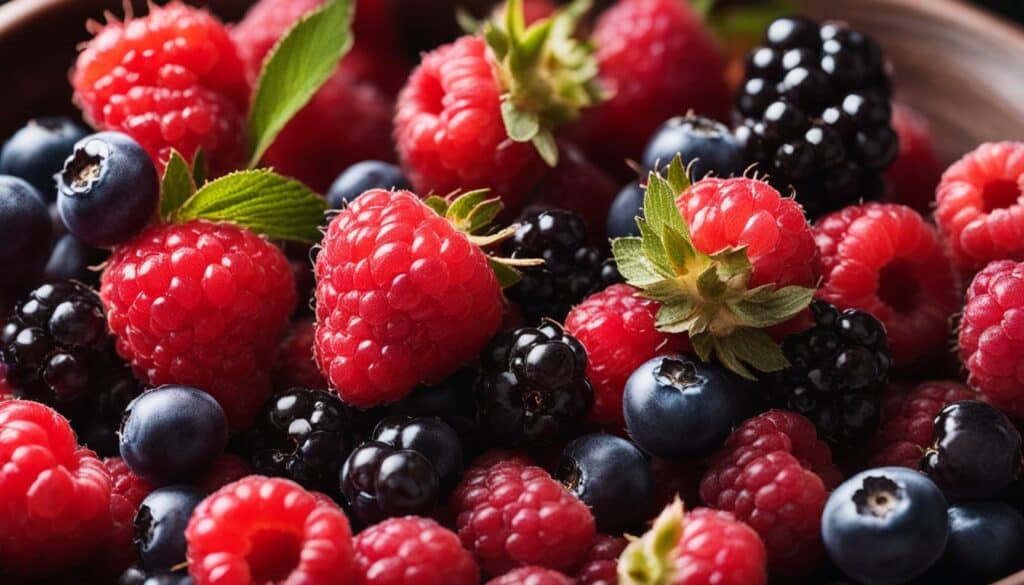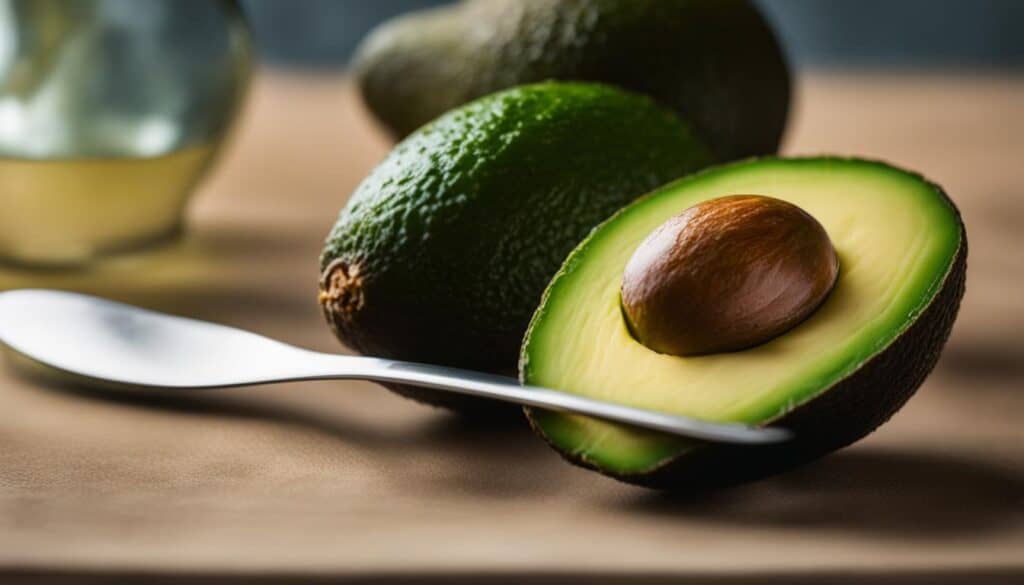When I’m sick and battling a fever, I know that choosing the right foods is essential for my recovery. That’s why I turn to fruits that can provide me with the necessary nutrients, vitamins, minerals, and antioxidants to support my immune system and aid in a quick recovery.
These fever-friendly fruits are not only delicious but also packed with immune-boosting properties. They are rich in vitamin C, anthocyanins, and other compounds known for their anti-inflammatory, antiviral, and immune-boosting effects. By incorporating these fruits into my diet, I can nourish my body and promote healing during fever.
Key Takeaways
- Fruits such as citrus fruits, berries, bananas, avocados, and ginger are excellent choices when you’re sick with a fever.
- These fruits are rich in vitamins, minerals, antioxidants, and fiber that support overall health and immune function.
- By including these fever-friendly fruits in your diet, you can aid in the recovery process and promote a quick recovery.
- Stay hydrated with hydrating fluids like water, herbal teas, and electrolyte solutions to prevent dehydration.
- Listen to your body’s needs and choose the fruits that work best for you during fever.
Chicken Soup and Broths
When it comes to finding comfort and nourishment during illness, chicken soup and broths have been trusted remedies for generations. These warm and soothing options are particularly beneficial when you’re sick, including during a fever.
Chicken soup is not only easy to eat, but it also provides essential vitamins, minerals, calories, and protein that your body needs for a speedy recovery. It is a comforting and nutritious option that can help replenish your energy levels.
What makes chicken soup even more beneficial during illness is its rich content of fluid and electrolytes. This can help prevent dehydration, which is especially important when you have a fever. Staying hydrated is essential for supporting your body’s healing processes and maintaining overall health.
Broths, like chicken soup, are excellent sources of fluid and electrolytes. They are gentle on the digestive system and can help relieve sinus congestion, making it easier to breathe. Homemade chicken soup made from bone broth is especially valuable as it contains collagen and additional nutrients that may promote recovery.
So next time you’re feeling under the weather, consider enjoying a comforting bowl of chicken soup or sipping on a nourishing broth. Not only will it provide comfort, but it will also assist in your recovery from illness.
Chicken Soup vs. Broths: A Nutritional Comparison
| Chicken Soup | Broths | |
|---|---|---|
| Fluid and electrolytes | ✔️ | ✔️ |
| Calories | ✔️ | ✔️ |
| Protein | ✔️ | |
| Minerals | ✔️ | |
| Collagen | ✔️ |
Garlic
Garlic, a versatile ingredient found in kitchens worldwide, has long been recognized for its remarkable health benefits. This potent bulb has been used in herbal medicine for centuries due to its numerous medicinal properties.
Garlic possesses powerful antibacterial, antiviral, and antifungal effects, as demonstrated in various scientific studies. These properties make it an excellent addition to your diet when you’re feeling under the weather.
Enhancing Immune Function
Garlic is known to boost immune function, helping your body fight off infections more effectively. Studies have shown that consuming aged garlic extract supplements can enhance immune response, reducing the severity and duration of illnesses like colds and flu.
Protecting Against Pathogens
Garlic’s active compounds, such as allicin, have been found to have broad-spectrum antimicrobial properties. These compounds can inhibit the growth and proliferation of various bacteria, viruses, and fungi.
“Garlic’s antibacterial, antiviral, and antifungal effects can help protect against a range of pathogens, making it a valuable ally in maintaining health and well-being.” – Expert from the University of Health Sciences
Flavorful and Effective
Adding garlic to your meals not only imparts a delicious taste but also makes your food more effective at combating cold or flu symptoms. By incorporating garlic into your culinary creations, you can make your dishes both flavorful and immune-supportive.
Garlic Table:
| Benefits of Garlic | |
|---|---|
| Enhances immune function | ✓ |
| Antibacterial properties | ✓ |
| Antiviral properties | ✓ |
| Antifungal properties | ✓ |
Garlic possesses a wide array of benefits, supporting immune function and providing protection against harmful pathogens. By harnessing its powerful properties, you can enhance your body’s natural defenses during times of illness.
Citrus Fruits
When it comes to boosting your immune system during a fever, citrus fruits are a top choice. Oranges, grapefruits, and lemons are not only refreshing and delicious but also packed with vitamin C, which plays a crucial role in supporting immune function.
Vitamin C is a powerful antioxidant that helps neutralize harmful free radicals and protects immune cells from damage. It also stimulates the production of immune cells, such as white blood cells, which are essential in fighting off common colds, flu, and other infections.
The Benefits of Vitamin C:
- Decreases the duration of cold symptoms
- Provides protection against various infections
While increasing your vitamin C intake may not prevent you from catching a cold, it can certainly help reduce the severity and duration of symptoms, allowing you to recover faster.
| Citrus Fruits | Vitamin C Content (mg per serving) |
|---|---|
| Oranges | 70 |
| Grapefruits | 44 |
| Lemons | 30 |
Including citrus fruits in your diet during a fever can provide a natural boost of vitamin C and other beneficial compounds that support your immune system. Enjoy them as a fresh snack, squeeze their juice into homemade beverages, or incorporate them into delicious recipes to enhance both flavor and overall nutritional value.
Berries and Other Fruits High in Anthocyanins

During fever, it’s essential to nourish your body with foods that support your immune system and promote healing. Berries, such as strawberries and blueberries, along with other fruits high in anthocyanins, are excellent choices that offer multiple health benefits.
Anthocyanins, the antioxidants responsible for the vibrant red and blue colors of these fruits, have been found to possess powerful anti-inflammatory, antiviral, and immune-boosting properties. Studies have shown that fruit extracts high in anthocyanins can even hinder the attachment of common viruses and bacteria to cells, while stimulating the body’s immune response.
Incorporating berries and other anthocyanin-rich fruits into your diet can be as simple as enjoying a bowl of oatmeal topped with fresh berries or blending them into a refreshing smoothie. Either way, you’ll be adding a dose of immune-boosting power to your meals.
So, let’s take a closer look at the impressive benefits of including these delicious fruits in your fever-friendly diet.
1. Anti-inflammatory effects
Anthocyanins have been shown to possess potent anti-inflammatory properties. By reducing inflammation in the body, these compounds can help alleviate fever symptoms and promote overall healing. Including berries and other anthocyanin-rich fruits in your diet during fever can support your body’s natural inflammatory response and provide relief.
2. Antiviral properties
Studies have demonstrated that anthocyanins found in berries and other fruits have antiviral effects. These compounds can inhibit the replication and attachment of common viruses to cells, reducing their activity and potentially speeding up recovery. Adding anthocyanin-rich fruits to your diet during fever can help strengthen your body’s defense against viral infections.
3. Immune-boosting benefits
Berries and other fruits high in anthocyanins are packed with essential vitamins, minerals, and antioxidants that can support your immune system. These nutrients help strengthen immune cells, enhance their function, and improve overall immune response. By incorporating these fruits into your diet, you can give your immune system the extra support it needs during fever.
Bananas

When you’re sick, including during a fever, bananas are an excellent fruit choice. They are not only soft and easy to eat but also packed with valuable nutrients and fast-acting carbohydrates that can provide nourishment and aid in the recovery process.
Bananas are a good source of potassium, which is an essential electrolyte that helps replenish stores in the body. Adequate potassium intake is crucial during illness as it supports gastrointestinal health and helps maintain normal bodily functions. By incorporating bananas into your diet, you can ensure you’re getting this vital nutrient that promotes overall well-being.
In addition to being rich in electrolytes, bananas also contain soluble fiber. Soluble fiber acts as a prebiotic, promoting the growth of beneficial bacteria in the gut and supporting gastrointestinal health. It can also help reverse diarrhea by reducing the amount of free water in the digestive tract. Including bananas in your diet during fever can aid in restoring the balance of your digestive system and aid in your recovery.
“Bananas are a great fruit option during illness due to their soft texture, nutrient content, and potential to aid in gastrointestinal health.”
So, next time you’re feeling under the weather, don’t forget to incorporate bananas into your diet. They are a convenient and healthy snack that can provide essential nutrients, electrolytes, and soluble fiber to support your overall well-being and aid in your recovery during fever.
| Nutrient | Amount per 100g |
|---|---|
| Calories | 96 |
| Potassium | 358mg |
| Soluble Fiber | 2.6g |
Whether enjoyed on their own, blended into smoothies, or added to oatmeal or yogurt, bananas are a versatile and nutrient-rich fruit that can contribute to your overall well-being and promote a quick recovery during fever. So, don’t hesitate to grab a banana and give your body the nourishment it needs.
Ginger

Ginger is a powerful and versatile ingredient that offers a range of health benefits. It has been used in various culinary traditions, herbal medicine, and home remedies for centuries. Ginger is particularly renowned for its anti-nausea properties, making it a natural and soothing remedy for upset stomachs and nausea.
Studies have shown that ginger can effectively relieve nausea caused by pregnancy, cancer treatment, and other factors. The active compounds in ginger, such as gingerol and shogaols, have anti-inflammatory properties that can help soothe an upset stomach and reduce inflammation throughout the body. This soothing effect can be especially beneficial during fever, providing a sense of comfort and relief.
Ginger may also have immune-boosting effects, thanks to its rich antioxidant content. Antioxidants help protect the body from free radicals, which can damage cells and weaken the immune system. By including ginger in your diet during fever, you can potentially support your body’s immune response and promote overall well-being.
Incorporating ginger into your daily routine is easy and can be done in various ways. You can add fresh ginger to your meals by grating or chopping it and using it as a flavorful ingredient in stir-fries, soups, or marinades. Brewing ginger tea is another popular option, offering a warm and soothing beverage that can calm both the body and mind.
“Ginger has been a staple in my home for its anti-nausea effects. Whenever I feel queasy, a cup of ginger tea always does the trick and provides instant relief.”
For those who prefer a carbonated option, ginger ale can be a refreshing choice. However, it’s important to note that commercial ginger ale may contain high amounts of sugar, so opt for natural or homemade versions when possible.
Regardless of how you choose to consume it, ginger can be a valuable addition to your diet during fever. Its anti-nausea, soothing, anti-inflammatory, and potential immune-boosting properties make it a natural remedy that can provide comfort and support your body’s healing process.
Avocados

Avocados are a nutritious fruit to incorporate into your diet during fever, as they offer a wealth of health benefits. They are rich in monounsaturated fats, which are considered healthy fats that support your body’s recovery. Additionally, avocados are packed with fiber, vitamins, and minerals that contribute to your overall well-being.
The monounsaturated fats found in avocados, such as oleic acid, have been shown to reduce inflammation in the body. Inflammation is a natural response to infection or injury, but excessive inflammation can prolong the recovery process. By consuming avocados, you can help decrease inflammation and promote a faster recovery from fever.
Avocados also play a role in supporting immune function. The nutrients present in avocados, including vitamins C and E, folate, and zinc, help enhance the immune system’s response to infections. By strengthening your immune function, you can better fight off the pathogens causing your fever and facilitate a quicker healing process.
Incorporating avocados into your diet during fever provides nourishment and aids in inflammation reduction and immune support. Try adding slices of avocado to salads, spreading avocado on toast, or blending it into a smoothie for a delicious and nutritious boost.
Benefits of Avocados:
- Rich in monounsaturated fats
- High in fiber, vitamins, and minerals
- Decreases inflammation
- Supports immune function
“Avocados are not only creamy and delicious, but they are also a powerhouse of nutrients. Their monounsaturated fats, fiber, and various vitamins and minerals make them a perfect choice for supporting your recovery during fever.”
Hydrating Fluids and Electrolytes

Staying hydrated is crucial when you’re sick, including during fever. Hydrating fluids like water, herbal teas, and electrolyte solutions can help prevent dehydration caused by vomiting, diarrhea, or excessive sweating.
It is recommended to drink eight to ten cups of fluids, primarily water, daily. Sipping on hydrating fluids throughout the day can prevent dehydration and replenish electrolyte stores. Adequate hydration supports your body’s overall well-being and aids in the recovery process.
Conclusion
When experiencing fever, incorporating the right fruits into your diet can play a crucial role in supporting your recovery and providing essential nutrients. Fruits such as citrus fruits, berries, bananas, avocados, and ginger have anti-inflammatory, immune-boosting, and soothing properties that can aid in your overall health and immune function. These fruits are rich in vitamins, minerals, antioxidants, and fiber, which are vital for nourishing your body during fever and promoting a quick recovery.
To optimize your healing process, remember to stay hydrated with hydrating fluids such as water and herbal teas. Adequate hydration is essential for preventing dehydration caused by fever-related symptoms like sweating and vomiting. Listening to your body’s needs and staying hydrated will support your body’s overall well-being and aid in the recovery process.
By incorporating the best fruits for quick recovery, such as citrus fruits, berries, bananas, avocados, and ginger, into your diet during fever, you can provide the necessary nourishment to support your body’s healing processes. These natural remedies for fever not only have a positive impact on your immune function but can also help reduce inflammation and provide soothing relief during this time. So, make sure to include these fever-friendly fruits in your diet and support your immune system for a quicker recovery.
FAQ
What are the best fruits to eat during a fever for quick recovery?
The best fruits to eat during a fever for quick recovery include citrus fruits, berries, bananas, avocados, and ginger. These fruits are rich in vitamins, minerals, antioxidants, and fiber, which support overall health and immune function.
How can chicken soup and broths help during a fever?
Chicken soup and broths are excellent options when you’re sick, including during a fever. They provide essential nutrients, calories, and protein needed for recovery. Additionally, they are rich in fluids and electrolytes, which help prevent dehydration and relieve sinus congestion.
What are the benefits of consuming garlic during a fever?
Garlic has antibacterial, antiviral, and antifungal effects. It can enhance immune function and reduce the severity of colds and the flu. Adding garlic to your food when you’re sick can help fight off symptoms and promote recovery.
Why are citrus fruits beneficial during a fever?
Citrus fruits such as oranges, grapefruits, and lemons are rich in vitamin C, which plays a vital role in immune function. Vitamin C helps neutralize harmful free radicals and supports the production of immune cells. Including citrus fruits in your diet during a fever can provide a boost of vitamin C and other beneficial compounds.
What makes berries and other fruits high in anthocyanins beneficial during fever?
Berries and other fruits high in anthocyanins have strong anti-inflammatory, antiviral, and immune-boosting effects. They contain antioxidants that can prevent the attachment of common viruses and bacteria to cells and stimulate the body’s immune response. Adding these fruits to your diet during a fever can provide a range of health benefits.
Why are bananas recommended during fever?
Bananas are soft, easy to eat, and rich in nutrients and fast-acting carbs. They are a good source of potassium, which helps replenish stores and supports gastrointestinal health. Bananas also contain soluble fiber, which can help reverse diarrhea. Incorporating bananas into your diet during fever can provide nourishment and aid in the recovery process.
How can ginger help during a fever?
Ginger has anti-nausea effects and can relieve an upset stomach. It also has anti-inflammatory properties and may have immune-boosting effects. Adding fresh ginger to food, brewing ginger tea, or consuming ginger ale can provide relief from nausea and support overall well-being during a fever.
What are the benefits of avocados during fever?
Avocados are nutritious and contain healthy monounsaturated fats, fiber, vitamins, and minerals. They provide calories and essential nutrients that support the body’s recovery. Avocados, especially the fatty acid called oleic acid, can aid in reducing inflammation and play a role in immune function during fever.
Why is staying hydrated important during a fever?
Staying hydrated is crucial during a fever to prevent dehydration caused by vomiting, diarrhea, or excessive sweating. Hydrating fluids such as water, herbal teas, and electrolyte solutions can replenish fluids and electrolytes, supporting overall well-being and aiding in the recovery process.
How can incorporating the right fruits into my diet help during a fever?
Incorporating the right fruits into your diet during a fever can support your recovery by providing essential nutrients, boosting immune function, and soothing symptoms. These fruits are rich in vitamins, minerals, antioxidants, and fiber, which promote overall health and aid in the healing process.





Leave a Reply